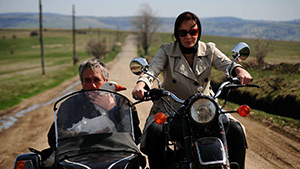Like the main character in The Phantom Father, I felt compelled to do some research about history. Specifically, your history. I was curious how someone with a decidedly non-Romanian name gets not only a small role, but a co-writer credit on a Romanian film. And then I felt shame. You wrote Wild at Heart! And Lost Highway! I love David Lynch - I should know this!
With that embarrassing hole in my cinematic knowledge filled in, the pieces quickly fell into place. Your involvement with the movie suddenly made a lot more sense: the road movie structure; the off-the-wall gangster characters; the maybe-they-are, maybe-they-aren't dream sequences. Only one thing seemed to not fit; how did this become a romantic comedy?
I'm guessing this is where director and co-writer Lucian Georgescu comes in. He must have thought it would help to lighten the mood by focusing on blossoming love. Well, if he did, he was wrong. It's not so much that this aspect is bad--the slow and tentative relationship feels honest--it's that when everything else comes in, the movie completely derails.
Robert Traum (Marcel Lures, in a stiff performance, possibly due to his not-very-successful American accent) is an American professor who travels to Romania to research his Romanian Jewish rots and learn about the father he barely knew. There he meets Tanya (Mihaela Sirbu, relaxed and charming), a local historian who agrees to be his driver and guide. There's your road movie. I suppose adding some light romance was a pretty simple graft. I could have seen this becoming one of those foreign movies that, as promised in 1990s-era Miramax trailers, "celebrates everything you love about life!"
But there's more. The couple's search eventually leads them in pursuit of Sami, one of Robert's father's oldest friends. Sami travels the countryside in a caravan, showing movies in an ad-hoc theatre. He's also pursued by gangsters. We are told he was kicked out of his town by a corrupt mayor who is fixing to replace Sami's theatre with a shopping mall, even though his dilapidated town looks to have a population of 300. For some reason though, the mayor and his two gangster thugs still chase Sami through the countryside and remind him that no one likes the movies he shows. That's about as threatening as they get.
Once all these characters are introduced, The Phantom Father really doesn't know what to focus on anymore. Is it about Robert's relationship to his past? His interest in Tanya? Is it a caper about outsmarting the gangsters? Is Robert imagining all of this? These aren't rhetorical questions. I'd like you to tell me because the film never answers them.
Things got so muddy that by the end, I was wondering if large portions of what I saw were dream sequences. There is one for-sure sequence around the film's midpoint that is clearly a dream, but refreshingly, didn't end with a character waking up from sleep. That omission--along with an elliptical, disruptive editing style that I couldn't find any rhyme or reason for--made me question the reality of anything that came after it, especially as things got more outlandish and possibly violent. (Yes, _possibly _more violent: a secondary, harmless character seems to meet an untimely, uncalled-for end. Off-camera. I think.)
So yes, Barry, I'm throwing all of this back to you because, as the original source for this material, you must know where things came apart. Right? Maybe you can even describe it all to me, DVD commentary-style, as I watch the movie again. The same way a character in The Phantom Father, in a key moment, explains exactly what we're seeing in an old silent film, instead of letting the images tell the story. You know, the way movies are supposed to work.
Dreamily—or not?—yours,
Casey






